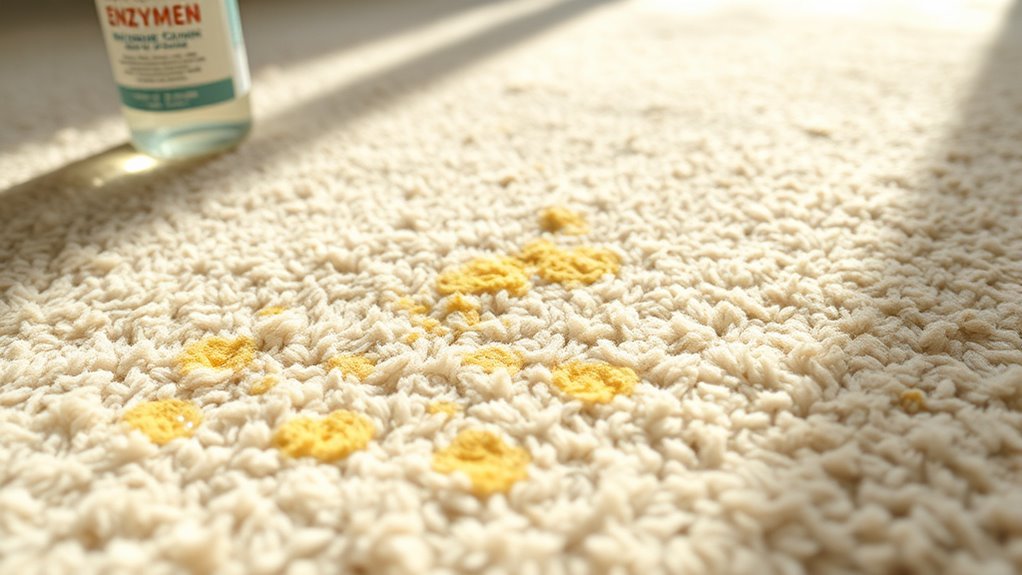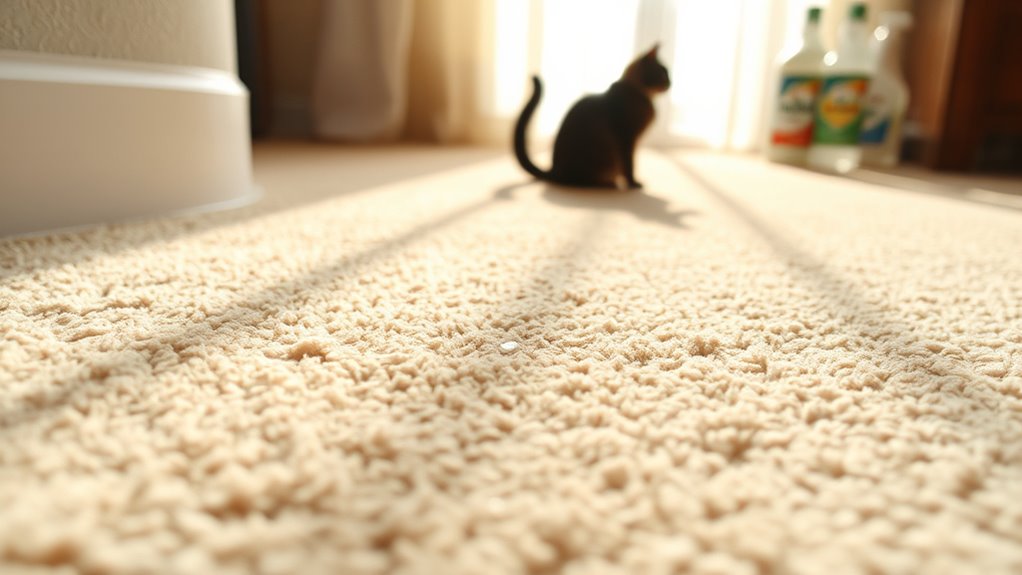If persistent cat urine smells won’t go away, enzyme-based cleaners are your best shot. They break down the organic compounds behind strong odors, unlike regular cleaners that only mask the scent. Be sure to thoroughly saturate the affected area and let the enzymes work for the recommended time. Repeating this process and using odor absorbers can make a big difference. Keep exploring to learn more effective tricks to fully eliminate stubborn smells.
Key Takeaways
- Use enzyme-based cleaners to biologically break down and eliminate organic urine compounds causing persistent odors.
- Saturate all affected areas thoroughly, including subfloor and upholstery, for effective odor neutralization.
- Allow enzymatic cleaners to sit for the recommended time to maximize odor removal.
- Repeated cleaning sessions may be necessary for stubborn or deeply soaked spots.
- Combine enzymatic cleaning with odor absorbers like baking soda or activated charcoal for long-lasting freshness.

Dealing with persistent cat urine smell can be incredibly frustrating, especially when regular cleaning methods fall short. If you’ve tried countless sprays and cleaning products without success, it’s time to contemplate how your cat’s litter box habits might be contributing to the problem. Cats are often sensitive to their environment, and if their litter box isn’t maintained properly, they might urinate outside it, leaving behind strong odors that linger. Ensuring the litter box is cleaned frequently—at least once a day—and using the right type of litter can make a significant difference. Some cats prefer fine, unscented litter, while others need larger or clumping options. Proper litter box hygiene helps prevent your cat from seeking alternative spots to urinate and reduces the overall odor in your home.
Once you’ve addressed the litter box habits, it’s fundamentally important to focus on effective odor neutralization methods. Conventional cleaning products might mask the smell temporarily, but they rarely eliminate the root cause. This is where enzyme-based cleaners come into play. Enzyme tactics work by breaking down the proteins in cat urine that cause that pungent, stubborn smell. When you use an enzyme cleaner, you’re practically feeding the enzymes with the organic compounds in the urine, which helps to completely neutralize the odor rather than just cover it up. Make sure to thoroughly saturate the affected area, including the subfloor or upholstery if necessary, and let the cleaner sit for the recommended time to give the enzymes a chance to do their job.
It’s also important to be persistent. You might need to repeat the cleaning process several times for the smell to fully disappear. Air out the space as much as possible and consider using odor absorbers like activated charcoal or baking soda afterward to keep the air fresh. Avoid using ammonia-based cleaners, as they can actually attract cats back to the same spot—they associate the smell with urine, making the problem worse. Instead, stick with enzymatic products designed specifically for pet urine and odors.
Frequently Asked Questions
Can Cat Urine Smell Linger Even After Cleaning?
Yes, cat urine smell can linger even after cleaning if you don’t address the root cause. Poor litter box habits or improper urine absorption can cause residual odor. You need to thoroughly clean the area with enzyme-based cleaners, which break down urine proteins. Otherwise, the smell might persist, encouraging your cat to revisit the same spot. Proper cleaning and addressing litter box habits are key to eliminating stubborn odors completely.
Are Enzyme Cleaners Safe for Pets and Children?
You might worry about enzyme safety, but many pet-safe cleaners are completely safe for children and pets when used as directed. Enzyme cleaners break down organic stains and odors without harmful chemicals. Always check labels for pet-safe claims, and follow application instructions carefully. Using reputable, enzyme-based products guarantees you’re effectively eliminating cat urine smell while keeping your loved ones safe and protected from harmful substances.
How Long Does Enzyme Treatment Typically Take?
Enzyme treatment typically takes between 24 to 48 hours to effectively eliminate cat urine smell, depending on the severity and size of the affected area. You’ll notice enzyme effectiveness as the smell diminishes over this period. For best results, guarantee the area stays moist and undisturbed during treatment. Keep in mind, tougher spots may require additional applications to fully neutralize odors and prevent your cat from re-soiling.
Can Homemade Remedies Effectively Remove Cat Urine Odor?
Like a modern-day alchemist, you can attempt homemade solutions for odor elimination, but they often fall short of professional enzyme treatments. While some DIY remedies—like baking soda or vinegar—may temporarily mask the smell, they rarely fully remove the persistent cat urine odor. For lasting results, it’s best to combine homemade solutions with enzymatic cleaners, ensuring you target the odor at its source and restore freshness to your space.
Why Does the Smell Keep Returning Despite Cleaning?
The smell keeps returning because urine stain removal wasn’t thorough, leaving traces that cause odor to persist. Enzyme cleaner effectiveness varies; if not applied properly or left on too briefly, it may not fully break down odor-causing proteins. To prevent this, make sure you use a high-quality enzyme cleaner, follow instructions carefully, and allow ample drying time. This approach helps eliminate residual odors and keeps your space smelling fresh.
Conclusion
If that stubborn feline fragrance refuses to fade, don’t lose hope. With a little enzyme magic, you can turn back time and reclaim your space from lingering hints of your cat’s secret adventures. Keep at it, and soon enough, the air will be fresh enough to enjoy again. Remember, patience and persistence are your best friends in this delicate dance. Before long, your home will smell as sweet as it once did—minus any unwelcome surprises.









